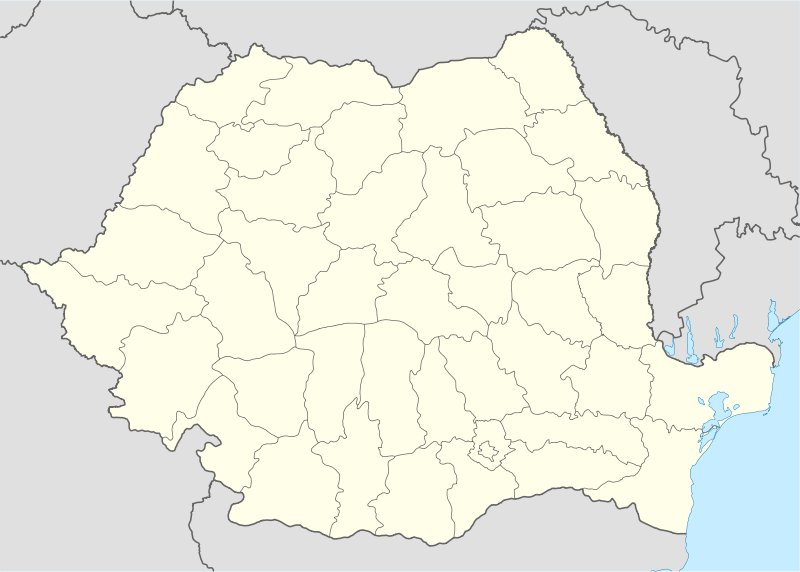Micia
| Micia | |
|---|---|
 The fort appears only as a raised level of earth. (2014) | |
 Location within Romania | |
| Known also as |
|
| Founded | 2nd century AD |
| Abandoned | c. 4th–5th century AD |
| Place in the Roman world | |
| Province | Dacia |
| Administrative unit | Dacia Apulensis |
| Administrative unit | Dacia Superior |
| Nearby water | Marisus |
| Directly connected to | |
| Structure | |
| — Stone structure — | |
| Size and area | 181 m × 360 m (6.5 ha) |
| — Wood and earth structure — | |
| Stationed military units | |
| — Legions — | |
| — Cohorts — | |
| — Alae — | |
| — Numeri — | |
| Maurorum Micensium[3] | |
| Location | |
| Coordinates | 45°54′43″N 22°48′55″E / 45.911806°N 22.815278°ECoordinates: 45°54′43″N 22°48′55″E / 45.911806°N 22.815278°E |
| Altitude | 186 m (610 ft) |
| Town | Mintia |
| County | Hunedoara |
| Country |
|
| Reference | |
| RO-LMI | HD-I-s-A-03214 [4] |
| RO-RAN | 91991.01 [4] |
| Site notes | |
| Recognition |
|
| Condition | Ruined |
| Exhibitions | Muzeul Civilizației Dacice și Romane, Deva |
Micia was a large Roman fort for auxiliary troops and an important part of the western Dacian limes (limes Dacia). The archaeological site is located near the municipality of Vețel (Witzel), Hunedoara county in Transylvania, Romania. This Roman garrison monitored and secured the road and the river route to Partiscum, today Szeged, Hungary. In addition, there was a strategically important river port. In the civil settlement, there were large baths and a small amphitheater. The large number of ancient inscriptions are significant.
Castra
 View from thermae (2014)
View from thermae (2014) Nordic vallum of the fort (2014)
Nordic vallum of the fort (2014) Eastern vallum of the fort (2014)
Eastern vallum of the fort (2014) Western vallum of the fort (2014)
Western vallum of the fort (2014) The plan of castra
The plan of castra
Vicus
 Buildings (2014)
Buildings (2014) Buildings (2014)
Buildings (2014) The Marisus river north of the vicus (2014)
The Marisus river north of the vicus (2014)
Thermae
 Thermae (2014)
Thermae (2014) Thermae (2014)
Thermae (2014) Thermae (2014)
Thermae (2014)
Amphitheater
In the southeast of the great military bath, at a distance of about hundred meters, there was a small amphitheater. Possessed in a circle around an arena, the stone foundation of the walls had a circumference of 104 meters. The arena consisted of 31 × 29 meters.[5]
 The amphitheater (2014)
The amphitheater (2014) The plan of amphitheater
The plan of amphitheater
Necropolis
- Funerary monument, 2nd century AD.
- Funerary monument, 2nd century AD.
See also
Notes
- 1 2 3 Micia
- 1 2 Țentea, Ovidiu (2012). "EX ORIENTE AD DANUBIUM - The Syrian units on the Danube frontier of the Roman Empire". MEGA Publishing House. Retrieved 2014-03-17.
- 1 2 3 Tactică, strategie și specific de luptă la cohortele equitate din Dacia Romană, Petru Ureche
- 1 2 "Situl arheologic de la Veţel-Micia". National Archaeological Record of Romania (RAN). ran.cimec.ro. 2013-06-06. Archived from the original on 2014-03-04. Retrieved 2014-02-04.
- ↑ Russell L. Sturzebecker: Photo Atlas. Athletic-Cultural Archaeological Sites in the Greco-Roman World. Europe, North Africa & the Middle East. Russell L. Sturzebecker, West Chester, PA 1985. ISBN 0-9600466-2-3. p. 349.
External links

- Roman castra from Romania - Google Maps / Earth